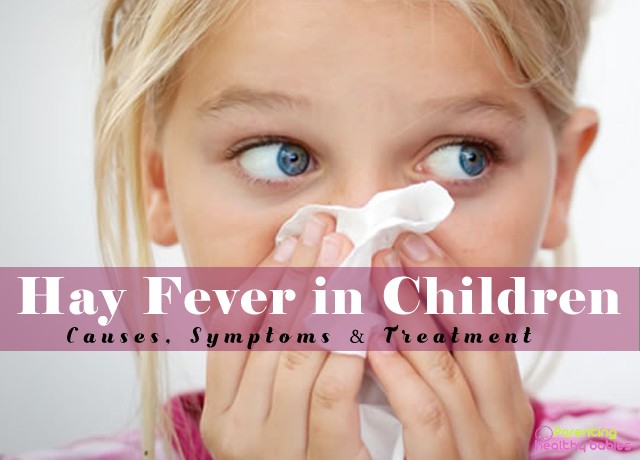What can be more irritable than a runny nose all day long? Imagine carrying your handkerchief everywhere you go and imagine your eyes turning red and itchy every morning you wake up! Horrible, right? This almost feels like a torture for children and this is what we call hay fever, which is caused by pollen from grasses, flowers or trees. Pollen levels are the highest in the early morning and early evening. There are a numerous causes for hay fever in children but don’t worry we have got a solution for this.
Causes, Symptoms and Treatment of Hay Fever in Children
Causes of Hay Fever in Children
Hay fever is an allergic reaction. During the summer and spring months, a fine powder is released by plants which is called pollen and some children get allergic to it.
There are three pollenseasons which are mainly Tree pollen, Grass pollen and Weed pollen. Tree pollen is the one between late march and mid May, Grass pollen between mid May and July and that last one which is Weed pollen between the end of June and September.it is conspicuous that hay fever is pretty uncommon in children under the age of five,. However, if the other members of the family are affected or prone to hay fever, your child may also catch it. Does your child get hold of cold at the same time every year? It is most certain that he/she is more prone to seasonal allergy. Some of the causes are listed below:
- Dust mites
- Mould spores
- Cigarette smoke
- Animal fur or hair
- Pollen (from grasses, flowers and trees)
But what is not certain is that if a person can be allergic to one or more types of pollen. This can only be determined at the time of symptoms. These allergies can start at any age which means that even if your children never suffered from hay fever in the past 8 or even 10 years, they can also develop them.
Read more: Common Allergies among Children
Symptoms of Hay Fever in Children
Does your child develops cold at the same time every year? If yes, then seasonal allergies are to be blamed. But you do have to keep a check on the symptoms. Your nose is not the only organ that is affected at the time of hay fever but there are a many more to keep a check on. Some of these are listed as below:
- A runny nose
- Red, itchy, swollen or watery eyes
- Blocked nose(both or one nostrils)
- Headaches
- Sneezing frequently
Read more: 7 Remedies for Cough and Cold in Kids
It is extremely important to provide your child with a proper treatment if they are suffering from hay fever. If hay fever is left untreated it can lead to a number of health problems such as tiredness, poor quality sleep and daytime sleepiness.
Hay fever can also lead to the following conditions-
- Create eye infections because people rub itchy eyes.
- Increasing the probability of sinus infections
- Lead to bad breath or a sore throat
- Affect learning performance in children
- Make asthma severe
Treatment for Hay Fever in Children
The primary step is to identify the cause of your child’s allergic reaction so that after knowing the cause at least you can try to avoid or minimize it. Medication is another option that you can rely on .
You should take your child to the doctor in order to find the particular allergens. As stated above, your child can also be allergic to one or more pollen. The doctor will put up certain questions in order to find the exact cause and can also suggest some tests if required to find the cause.
Hay fever can not be cured but there can be a number of ways you can minimize the symptoms. Medication can also be suggested by your doctor such as non-sedating antihistamines or nasal sprays which may work for some children.
- Keep a count on the pollen count and do not let you little one out in case it is too windy.
- Do not open the windows and rather use an air conditioner in your home.
- Do not dry the clothes outside because apparently pollen will stick to the clothes.,
- Wash her face, hair and hands when she comes back home and change her clothes.
- Always keep the car windows shut while driving.
- Ask your child to wear sunglasses, this will prevent the pollen from entering her eyes.
- Wipe down your pet because the pollen can also attach to their furs and bathe them regularly.
Read more: Busy Mom’s Guide to Common Illnesses and Management
Hope this article was of help for all our parents!! Please share your comments/queries/tips/ banana recipes with us and help us create a world full of Happy and Healthy Babies!!
